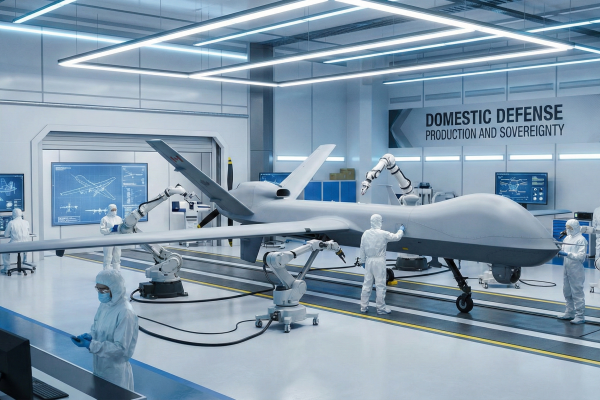March 10th, 2022 | 12:04 CET
Defense Metals, Gazprom, ThyssenKrupp - Winners and losers
A brave Ukrainian woman hunts down a Russian drone - with a well-aimed throw through a jar of pickled tomatoes. For defense, every means is justified. But there is also a more strategic way to invest in companies that supply raw materials for military technology - and without conflict for investors with a sense of justice. The German economy, on the other hand, could be in for a real shock if Gazprom makes good on its threats and shuts down Nord Stream 1 as a result of the sanctions. Germany is one of the biggest buyers of Russian gas. ThyssenKrupp is also benefiting from the current situation. It becomes quite clear what the Group is really gaining from right now.
time to read: 5 minutes
|
Author:
Juliane Zielonka
ISIN:
DEFENSE METALS CORP. | CA2446331035 , GAZPROM ADR SP./2 RL 5L 5 | US3682872078 , THYSSENKRUPP AG O.N. | DE0007500001
Table of contents:

"[...] The Oxbow Asset now delivers a substantial free cash flow stream to internally fund our impactful drilling and workover programs. [...]" John Jeffrey, CEO, Saturn Oil + Gas Inc.
Author
Juliane Zielonka
Born in Bielefeld, she studied German, English and psychology. The emergence of the Internet in the early '90s led her from university to training in graphic design and marketing communications. After years of agency work in corporate branding, she switched to publishing and learned her editorial craft at Hubert Burda Media.
Tag cloud
Shares cloud
Defense Metals - Raw materials for modern military technology
Today is day 15 of the Russian war of aggression in Ukraine. An end is not yet in sight. Thus, for us Europeans, the unfamiliar image of a war just 1,000km away comes to mind. Defending a democracy through diplomatic skill alone is more wishful thinking than reality. Rather, a strong military infrastructure is needed to defend the country against potential attackers.
According to a compilation at Statista, China, India and the United States have the largest military forces. With a troop strength of 2 million, China leads the way, followed by India with 1.45 million, and in third place is the US with 1.39 million troops. For comparison, Ukraine has just under 200,000 troops and Germany has only 184,000 in its military.
China's sympathy with Russia highlights the urgent need for alternatives for raw materials used in the production of military technology. These include, above all, rare earths, which are used in the arms industry. Whether in fighter jets, drones, communications equipment, precision-guided weapons or night-vision devices. Here, too, China is the world's number one in the procurement of rare earths.
A good alternative is offered in North America to profit from the boom in the defense industry. Defense Metals Corp. is a mineral exploration company with its own deposit of rare earths. The Company mines the very elements needed for national security, the military, and beyond for the electric vehicle market.
The area in Wicheeda, Canada, that the Company currently uses for rare earth mining holds promising mineral resources. Recent drilling confirmed significant mineralization at depth. That gives the Company the potential to expand its mineral resource. The 2,008-hectare Wicheeda property, which is 100% owned by Defense Metals Corporation, is located approximately 80km northeast of the city of Prince George in British Columbia.
Luisa Moreno, President of Defense Metals states, "Drilling at depth at the northern Wicheeda deposit has uncovered significant new zones of high-grade rare earth mineralization that have the potential to expand the mineral resource and, more importantly, could also help support higher grades throughout the potential life of the mine."
That means Defense Metals is well-positioned, thanks to its mineral deposits, to extract the raw materials that support military forces defending their country. Detailed information on the stock is provided by a recent report report at researchanalyst.com.
Gazprom - Gas deliveries through Ukraine continue
Despite the war, the Russian company Gazprom continues to deliver gas through Ukraine to supply neighboring countries. According to the Slovak gas transport company Eustream, the amount of Russian gas arriving at the Slovak border after a journey of about 1,287km through Ukraine has even increased since the beginning of the war.
The daily delivery volume continues to be 109.5 million cubic meters as contractually agreed, Gazprom spokesman Sergei Kupriyanov said, according to the Interfax agency. Russia stressed to remain a reliable supplier of the valuable gas even in times of crisis. However, Moscow threatened this week to shut down Nord Stream 1 if sanctions continued.
EU states agreed yesterday on further sanctions against the warmonger. The previous three sanctions packages will be supplemented with regulations on cryptocurrency trading and export bans on certain technologies. Additionally, sanctions are planned for the shipping industry, according to the EU presidency. While oil and gas exports have so far been excluded from the sanctions, alternatives from Russian gas are being sought, he said. Europe remains heavily dependent on Russian gas. Around 40% of demand is covered by Gazprom deliveries.
Germany, in particular, would suffer from a halt in gas deliveries from Nord Stream 1. The main share of Russian gas enters the country via this pipeline. Germany imported 142 billion cubic meters (bcm) of gas in 2021, 6.4% less than in 2020, according to the Office of Foreign Trade Statistics (BAFA). According to Independent Commodity Intelligence Services (ICIS), Russian pipeline gas imports led the pack in December 2021 with 32% of supply, followed by Norway with 20% and the Netherlands with 12%. A suspension of Russian supplies would severely disrupt the German economy.
ThyssenKrupp - Steelmakers help in Ukraine
After Mrs. Merkel suggested knee bends for freezing students as a warming idea instead of having air filters installed in public schools, the citizen is already used to a lot from the proposals of his federal government in dealing with the Corona pandemic. Robert Habeck also follows up, in view of the tensions with Russia. "If you want to hurt Putin a bit, then save energy. All citizens could make a contribution there," said the Green minister. Means translated: Turn down the heating a few degrees and freeze a bit in solidarity with the badly run energy policy of recent years. Considering a COVID-19 virus that comes with cold-like symptoms, that may not be the best suggestion.
On the other hand, things really heated up at ThyssenKrupp with a large-scale fundraising campaign for Ukraine. The works councils of IG Metall called for help and were pleased to receive numerous donations: baby food, hygiene articles, medicines, clothing and blankets were collected in large quantities. Thomas Hay, a metalworker from Bochum, initiated the campaign. "Our destination is the village of Medyka on the Polish-Ukrainian border. Sometimes you just have to do it," says Hay, spurred on by so much humanity. Next week, the steelworkers and metalworkers want to help again and provide Ukrainian emergency doctors with sleeping bags. Some of the war refugees to be treated have been traveling for days in sub-zero temperatures and are severely hypothermic.
Thyssen itself is currently facing the challenges of transformation. On the one hand, the steel giant can look forward to full order books; on the other, some plants are threatened with short-time work. The conversion to renewable energies is a mammoth task for the long-established company. However, with such committed employees, the Company should be well equipped for the future.
Commodity mining acreage in Canada, such as Defense Metals is using, offers a smart alternative as an investment in military technology. The US defense industry's CAGR grew 0.5% in the past year. Through their Canadian neighbors, they are well-positioned in the production of innovative defense technology. Just how unhealthy dependencies are is particularly evident in Germany's precarious situation with regard to its gas supply. With 32%, Gazprom is the main supplier for the FRG and should Moscow make good on its threats, a new ice age could begin for the German economy. Against cold, whether human or weather-related, the helpful steelworkers of ThyssenKrupp are stepping up. With self-organized aid convoys they are actively supporting the people of Ukraine, who are suffering from Russia's war of aggression. The steel giant's order books are also full, making it a solid investment.
Conflict of interest
Pursuant to §85 of the German Securities Trading Act (WpHG), we point out that Apaton Finance GmbH as well as partners, authors or employees of Apaton Finance GmbH (hereinafter referred to as "Relevant Persons") may hold shares or other financial instruments of the aforementioned companies in the future or may bet on rising or falling prices and thus a conflict of interest may arise in the future. The Relevant Persons reserve the right to buy or sell shares or other financial instruments of the Company at any time (hereinafter each a "Transaction"). Transactions may, under certain circumstances, influence the respective price of the shares or other financial instruments of the Company.
In addition, Apaton Finance GmbH is active in the context of the preparation and publication of the reporting in paid contractual relationships.
For this reason, there is a concrete conflict of interest.
The above information on existing conflicts of interest applies to all types and forms of publication used by Apaton Finance GmbH for publications on companies.
Risk notice
Apaton Finance GmbH offers editors, agencies and companies the opportunity to publish commentaries, interviews, summaries, news and the like on news.financial. These contents are exclusively for the information of the readers and do not represent any call to action or recommendations, neither explicitly nor implicitly they are to be understood as an assurance of possible price developments. The contents do not replace individual expert investment advice and do not constitute an offer to sell the discussed share(s) or other financial instruments, nor an invitation to buy or sell such.
The content is expressly not a financial analysis, but a journalistic or advertising text. Readers or users who make investment decisions or carry out transactions on the basis of the information provided here do so entirely at their own risk. No contractual relationship is established between Apaton Finance GmbH and its readers or the users of its offers, as our information only refers to the company and not to the investment decision of the reader or user.
The acquisition of financial instruments involves high risks, which can lead to the total loss of the invested capital. The information published by Apaton Finance GmbH and its authors is based on careful research. Nevertheless, no liability is assumed for financial losses or a content-related guarantee for the topicality, correctness, appropriateness and completeness of the content provided here. Please also note our Terms of use.




